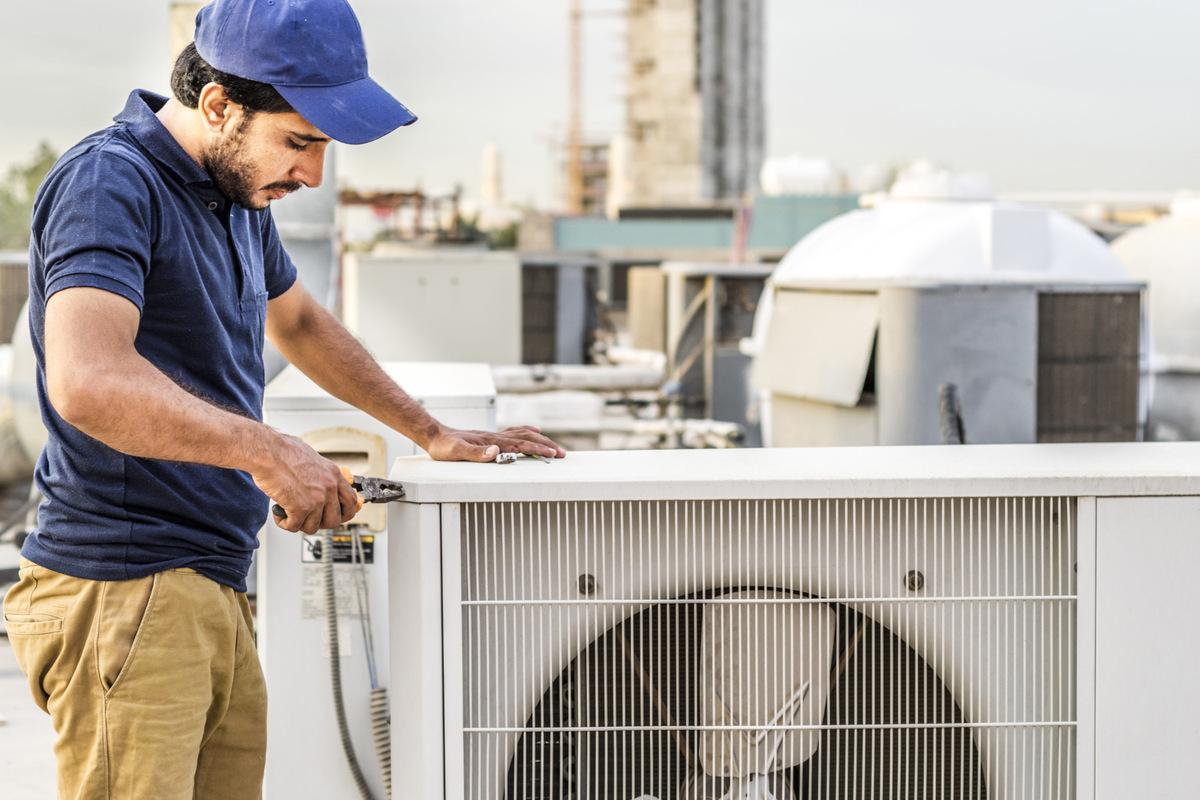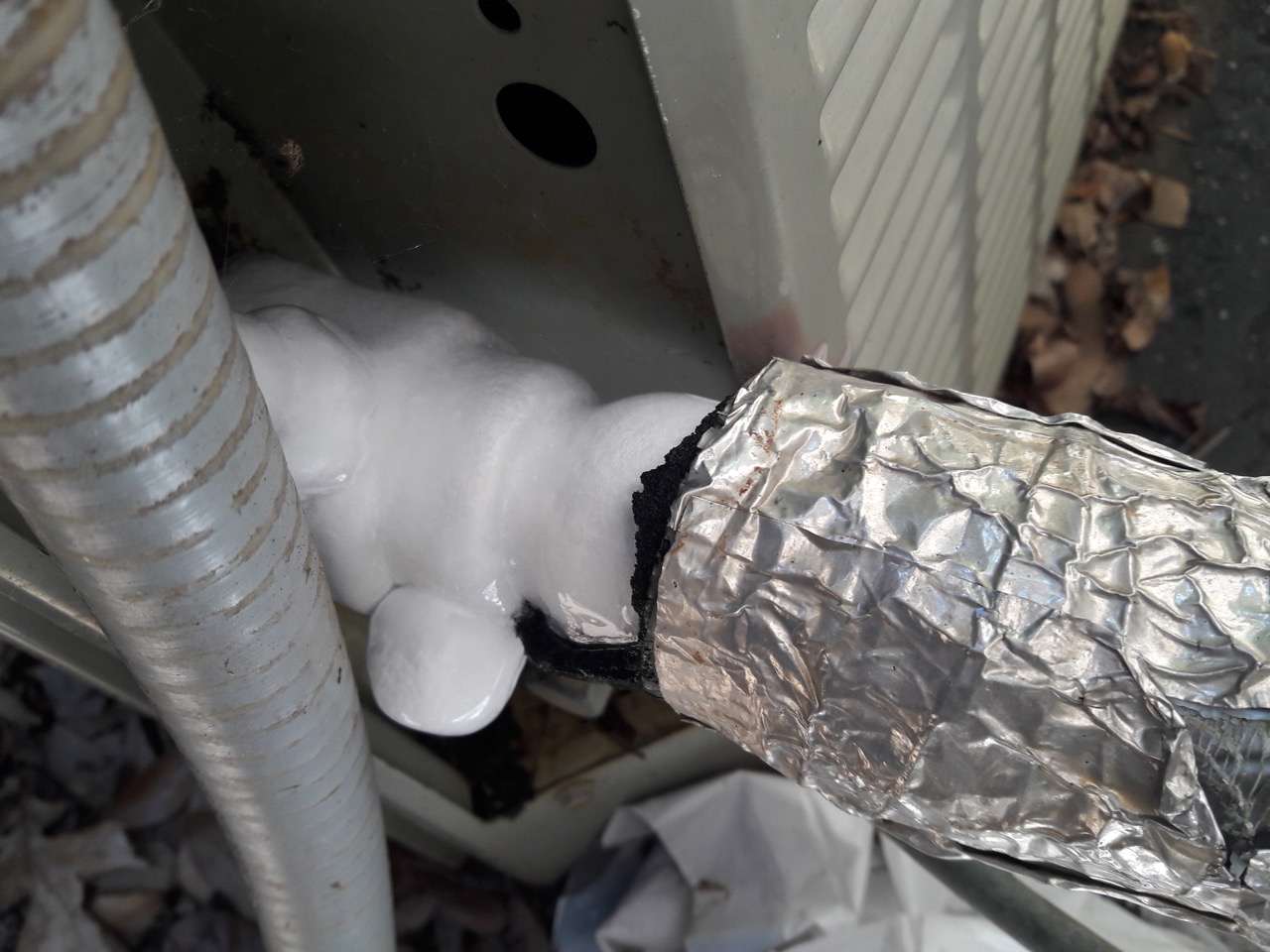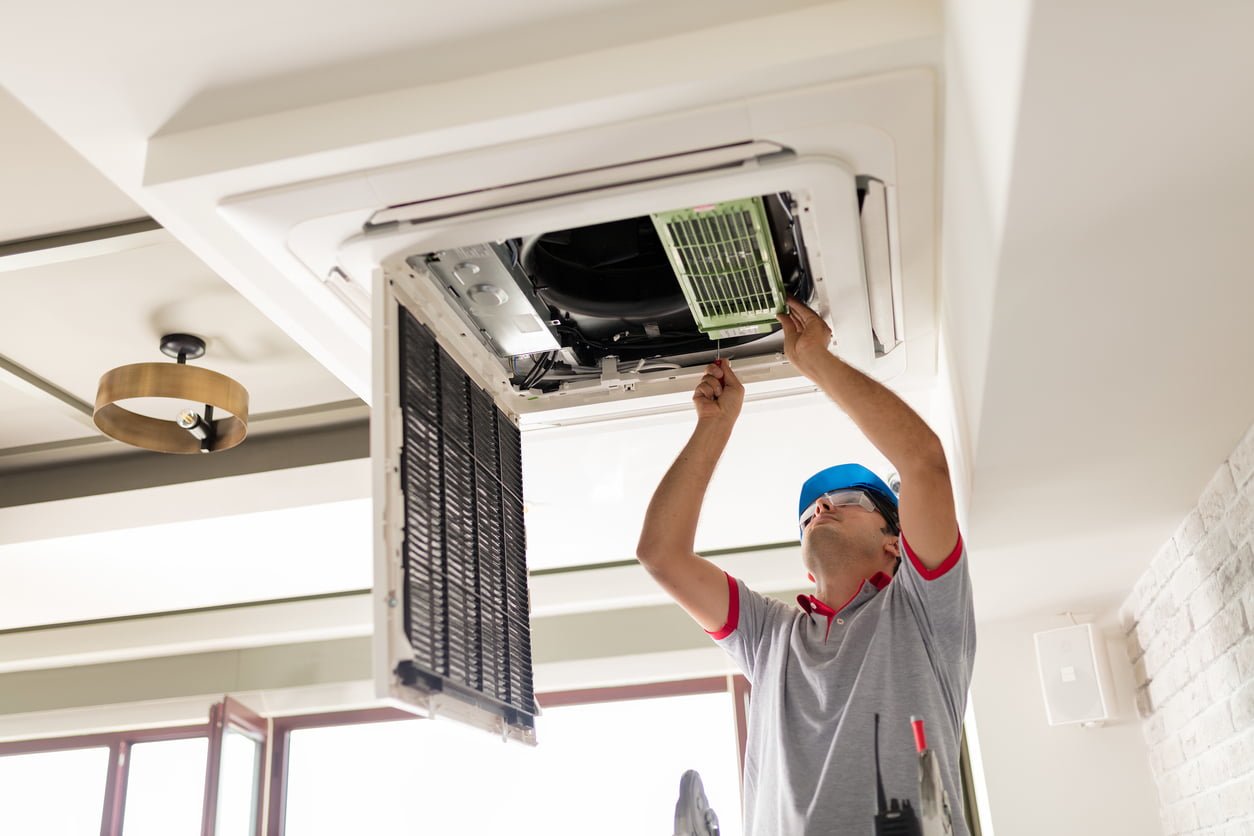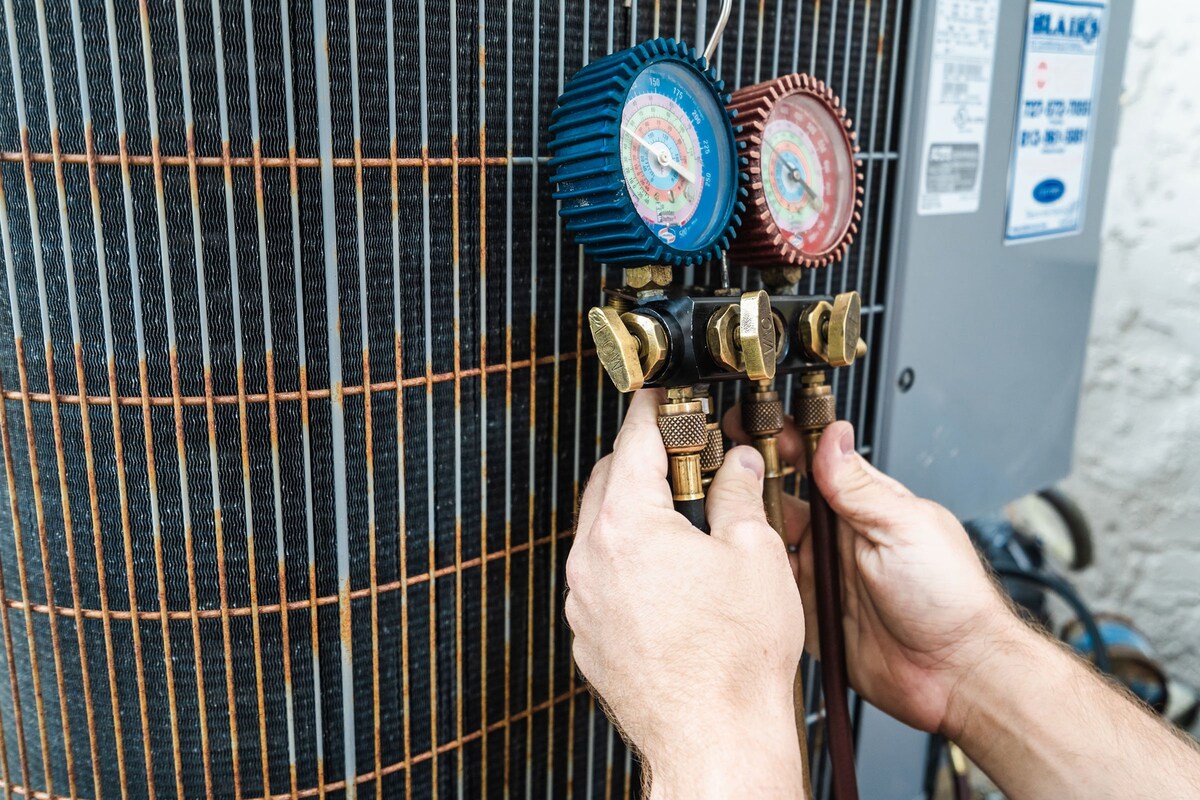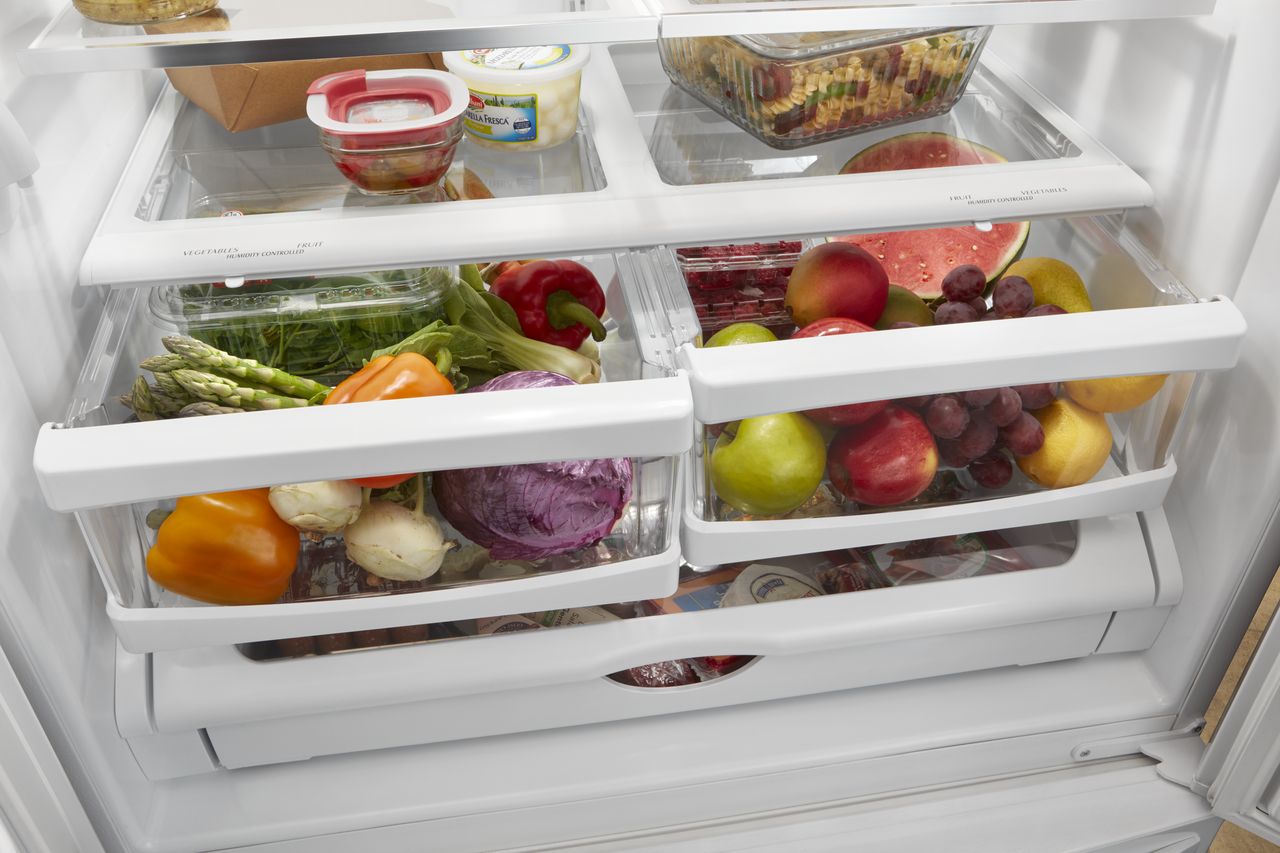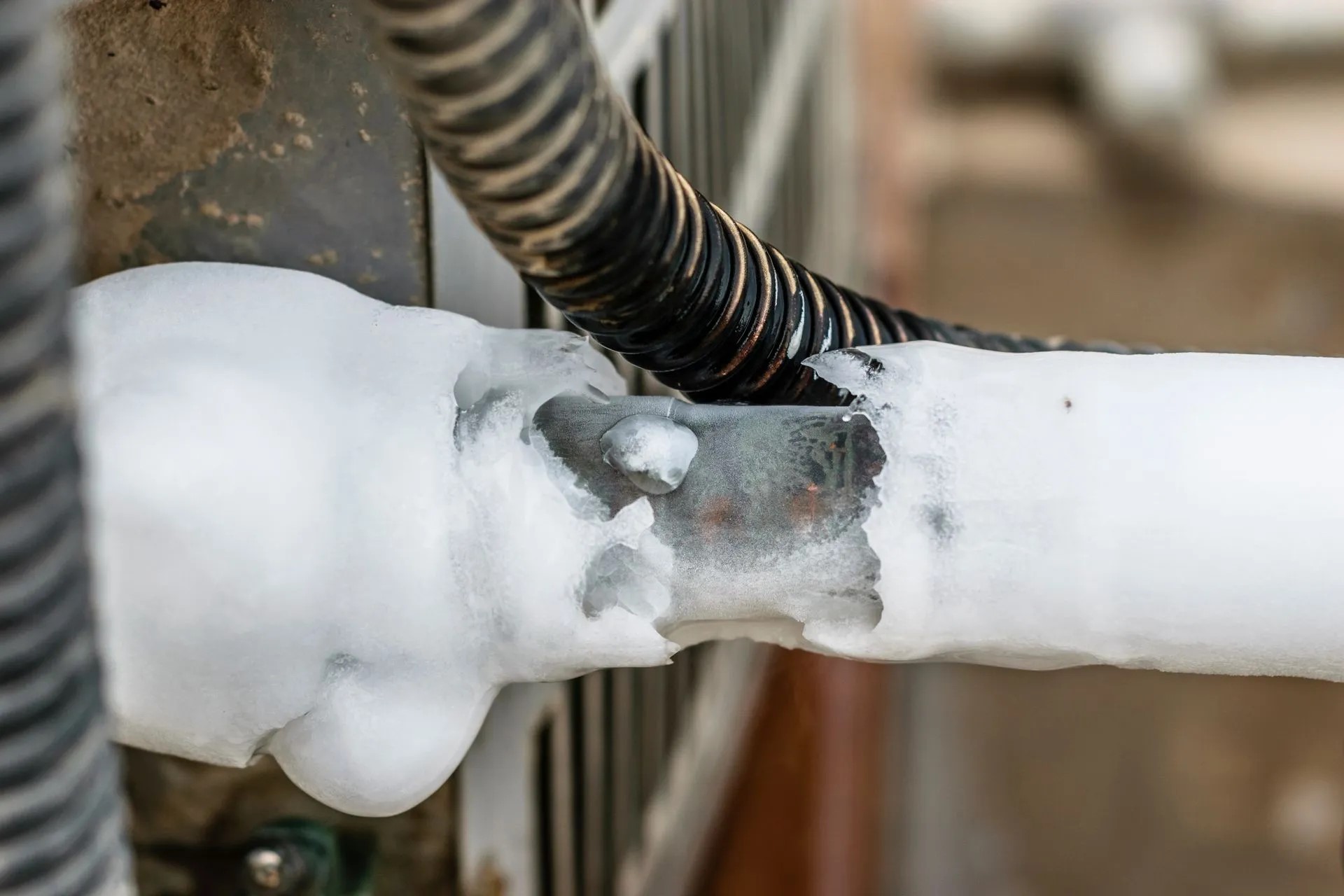Home>Home Maintenance>Why Are My Air Conditioning Pipes Freezing


Home Maintenance
Why Are My Air Conditioning Pipes Freezing
Modified: March 6, 2024
Learn why your air conditioning pipes are freezing and how to prevent this common home maintenance issue.
(Many of the links in this article redirect to a specific reviewed product. Your purchase of these products through affiliate links helps to generate commission for Storables.com, at no extra cost. Learn more)
Introduction
Welcome to your comprehensive guide on the common issue of air conditioning pipes freezing. If you’ve ever found yourself in a situation where your air conditioning system suddenly stops working or is unable to cool your home effectively, it’s possible that frozen pipes may be the culprit.
Understanding why air conditioning pipes freeze is crucial in order to prevent further damage to your system and ensure optimal performance. In this article, we will delve into the various causes of air conditioning pipes freezing and discuss possible solutions to help you troubleshoot the issue effectively.
Before we dive into the causes, it’s important to understand how air conditioning systems work. Air conditioning units not only cool the air but also dehumidify it. The dehumidification process involves removing moisture from the air, and this results in condensation. The condensation collects on the evaporator coil, but it’s drained away by a network of pipes and drains. However, under certain circumstances, these pipes can freeze, leading to a disruption in your cooling system.
Now that we have a basic understanding, let’s explore some of the common causes of air conditioning pipes freezing.
Key Takeaways:
- Keep your air conditioning pipes from freezing by regularly cleaning or replacing air filters, ensuring unobstructed air vents, and keeping registers open to maintain proper airflow.
- Prevent frozen pipes by addressing refrigerant levels, maintaining a properly functioning thermostat, and ensuring sufficient insulation for your air conditioning system.
Read more: Why Air Conditioning Unit Freezes Up
Understanding Air Conditioning Pipes
Before we delve into the causes of air conditioning pipes freezing, it’s essential to have a basic understanding of the different pipes involved in the system.
The primary pipes in an air conditioning system are the refrigerant pipes, also known as the suction line and the liquid line. These pipes circulate refrigerant throughout the system, absorbing heat from the indoor air and releasing it outside. The suction line carries cool refrigerant gas back to the compressor, while the liquid line transports high-pressure liquid refrigerant to the evaporator coil.
Another crucial component is the condensate drain pipe. This pipe is responsible for draining the condensation that accumulates on the evaporator coil during the cooling process. The condensate drain pipe carries the excess moisture away from the system and out of your home.
It’s important to note that air conditioning pipes are typically made of copper or aluminum due to their excellent heat transfer properties. They are insulated to protect against condensation and to improve energy efficiency.
Now that we have a basic understanding of the different pipes involved, let’s move on to exploring the various factors that can lead to air conditioning pipes freezing.
Causes of Air Conditioning Pipes Freezing
When air conditioning pipes freeze, it can significantly affect the performance and efficiency of your cooling system. Several factors can contribute to this issue, including:
Lack of Airflow
One of the primary reasons for air conditioning pipes freezing is a lack of adequate airflow. When the airflow is restricted or reduced, the evaporator coil, which is responsible for absorbing heat, can become too cold and cause the condensation on the pipes to freeze. Some common causes of airflow issues include:
- Dirty Air Filters: When the air filters in your HVAC system become clogged with dirt, dust, and debris, they restrict the airflow. This leads to a decrease in the amount of warm air passing over the evaporator coil, causing it to freeze.
- Blocked or Restricted Air Vents: Blocked or closed air vents prevent proper airflow, causing cold air to get trapped within the system and leading to freezing pipes.
- Closed or Blocked Registers: Registers or grilles that are obstructed or closed restrict the flow of air, which can result in frozen pipes.
Low Refrigerant Levels
Inadequate levels of refrigerant, such as Freon, in your air conditioning system can cause the evaporator coil to become excessively cold. This can result in frozen pipes. Low refrigerant levels are commonly caused by leaks in the system or an inadequate refrigerant charge.
- Leaks in the System: Over time, the refrigerant lines or connections in your air conditioning system may develop leaks, causing a decrease in refrigerant levels. These leaks need to be identified and repaired promptly to prevent frozen pipes.
- Inadequate Refrigerant Charge: If your air conditioning system has not been charged with the correct amount of refrigerant during installation or maintenance, it can lead to freezing of the pipes. It is important to ensure that the refrigerant charge is at the manufacturer’s recommended level.
Read more: Why Is My Air Conditioning Blowing Hot Air
Faulty Thermostat
A malfunctioning or improperly set thermostat can cause air conditioning pipes to freeze. The thermostat is responsible for regulating the temperature in your home. If it is set too low, the system may run continuously, causing the evaporator coil to get too cold and leading to frozen pipes.
- Incorrect Temperature Settings: If you set your thermostat too low or set it to a temperature that is significantly lower than the outdoor temperature, it can cause the evaporator coil to freeze and result in frozen pipes.
- Thermostat Malfunction: A faulty thermostat may not accurately measure the temperature, leading to incorrect cooling settings and potential freezing of the pipes.
Insufficient Insulation
Poor insulation of the air conditioning pipes and ductwork can contribute to freezing issues. Insulation helps to prevent the transfer of heat between the pipes and the surrounding environment. Without sufficient insulation, the pipes can become susceptible to freezing.
- Poorly Insulated Pipes: If the pipes carrying refrigerant are not adequately insulated, they can become too cold and freeze, affecting the overall performance of your air conditioning system.
- Lack of Insulated Ductwork: The ductwork that carries conditioned air throughout your home should also be properly insulated. Without insulation, the cool air can be prone to significant temperature loss, resulting in frozen pipes.
Problems with the Evaporator Coil
Issues related to the evaporator coil can also contribute to the freezing of air conditioning pipes. The evaporator coil plays a crucial role in the cooling process by absorbing heat from the indoor air. If the coil is dirty or if there is insufficient airflow across it, it can become too cold and cause the pipes to freeze.
- Dirty or Blocked Evaporator Coil: Over time, dust, dirt, and debris can accumulate on the surface of the evaporator coil, obstructing proper heat transfer and causing freezing of the pipes. Regular maintenance and cleaning of the coil are necessary to prevent this issue.
- Insufficient Airflow Across the Evaporator Coil: If there is inadequate airflow across the evaporator coil, it can lead to a buildup of cold air, resulting in frozen pipes. This can be caused by a malfunctioning fan or clogged air ducts.
Now that we have explored the various causes of air conditioning pipes freezing, it is essential to take appropriate measures to prevent and troubleshoot the issue. Regular maintenance, proper insulation, and addressing any airflow or refrigerant issues are key to ensuring the efficient operation of your air conditioning system and avoiding frozen pipes.
Lack of Airflow
A lack of adequate airflow is one of the primary reasons for air conditioning pipes freezing. When the airflow is restricted or reduced, the evaporator coil, which is responsible for absorbing heat, can become too cold and cause condensation on the pipes to freeze. Let’s explore some common causes of airflow issues:
Read more: Why Is My Car Air Conditioning Not Working
Dirty Air Filters
Dirty air filters can significantly impede the airflow in your HVAC system. Over time, air filters become clogged with dirt, dust, and debris, restricting the air from passing through effectively. As a result, the amount of warm air passing over the evaporator coil is reduced, leading to the coil becoming overly cold and causing the pipes to freeze.
To prevent this, it is crucial to regularly check and clean or replace your air filters as recommended by the manufacturer. This simple maintenance task can improve airflow and efficiency, preventing frozen pipes and extending the lifespan of your air conditioning system.
Blocked or Restricted Air Vents
Air vents that are blocked or obstructed can restrict the flow of air into your living spaces, leading to inadequate airflow and potential pipe freezing. Blocked air vents can occur due to furniture, curtains, or other objects obstructing the vents.
It is important to ensure that all air vents are clear and unobstructed to promote proper air circulation. Check each room in your home to ensure that none of the vents are blocked or covered. This will help maintain good airflow throughout your home and prevent freezing issues with your air conditioning pipes.
Closed or Blocked Registers
Registers, or grilles, that are closed or blocked can also contribute to a lack of airflow, potentially causing frozen pipes. Registers are the openings through which conditioned air is delivered into the rooms of your home. If these registers are closed or blocked by furniture, rugs, or other objects, it restricts the air from flowing freely. As a result, cold air can become trapped, causing the evaporator coil to become excessively cold and leading to frozen pipes.
Make sure that all registers in your home are open and unblocked. Take the time to rearrange furniture or remove any obstructions that may be hindering proper airflow. By keeping the registers open and clear, you can ensure that the air conditioning system functions efficiently, reducing the risk of frozen pipes.
By addressing these airflow issues, such as dirty air filters, blocked air vents, and closed registers, you can improve the airflow in your air conditioning system. This, in turn, helps maintain the proper functioning of the evaporator coil and prevents the occurrence of frozen pipes.
Low Refrigerant Levels
Inadequate levels of refrigerant, such as Freon, in your air conditioning system can cause the evaporator coil to become excessively cold. This can result in frozen pipes. Low refrigerant levels are commonly caused by leaks in the system or an inadequate refrigerant charge. Let’s dive deeper into these causes:
Read more: Why Is My Air Conditioning Unit Making Noise
Leaks in the System
Over time, the refrigerant lines or connections in your air conditioning system may develop leaks. These leaks can be due to factors such as corrosion, wear and tear, or poor installation. When there are leaks in the system, the refrigerant, which is responsible for absorbing heat from the indoor air, escapes. As a result, the refrigerant levels in the system decrease, causing the evaporator coil to become too cold and leading to frozen pipes.
If you suspect a refrigerant leak in your system, it is crucial to have it inspected and repaired by a professional HVAC technician. They have the expertise and equipment to locate and fix the leaks, ensuring that the refrigerant levels are restored and preventing freezing issues with your air conditioning pipes.
Inadequate Refrigerant Charge
The refrigerant charge in your air conditioning system refers to the amount of refrigerant that is necessary for optimal operation. If the system is not charged with the correct amount of refrigerant during installation or maintenance, it can lead to frozen pipes.
An incorrect refrigerant charge can occur due to factors such as inaccurate measurements, improper calculations, or human error. When the refrigerant charge is inadequate, the evaporator coil may not receive enough refrigerant to properly absorb heat, causing it to become overly cold and resulting in frozen pipes.
It is essential to ensure that the refrigerant charge in your air conditioning system is at the manufacturer’s recommended level. This requires the expertise of a professional HVAC technician who can accurately measure and adjust the refrigerant charge as needed. By maintaining the proper refrigerant charge, you can prevent freezing issues and ensure the efficient operation of your air conditioning system.
If you suspect low refrigerant levels in your air conditioning system, it is important to contact a qualified HVAC technician to diagnose and address the issue. They can perform a thorough inspection, check for leaks, and recharge the refrigerant to the appropriate level, helping to prevent frozen pipes and restore the performance of your air conditioning system.
Faulty Thermostat
A faulty thermostat can contribute to air conditioning pipes freezing. The thermostat is responsible for regulating the temperature in your home, and if it is not functioning correctly, it can cause the evaporator coil to become too cold, leading to frozen pipes. Let’s explore two common issues related to a faulty thermostat:
Incorrect Temperature Settings
If the temperature settings on your thermostat are set too low, it can cause the air conditioning system to run continuously. This continuous operation can result in the evaporator coil becoming excessively cold, causing condensation on the pipes to freeze.
It’s important to set your thermostat to a temperature that is appropriate for your comfort and the climate conditions. Avoid setting the temperature significantly lower than the outdoor temperature, as it may strain the system and lead to freezing issues. Find a comfortable temperature setting that allows your air conditioning system to cycle on and off appropriately, giving the pipes a chance to thaw and preventing frozen pipes.
Read more: Why Does My Window Air Conditioner Freeze Up
Thermostat Malfunction
A malfunctioning thermostat can also contribute to the freezing of air conditioning pipes. A faulty or improperly calibrated thermostat may not accurately measure the temperature in your home, resulting in incorrect cooling settings and potential freezing of the pipes.
If you suspect that your thermostat is malfunctioning, there are a few troubleshooting steps you can take. First, check the batteries in the thermostat and replace them if necessary. Next, ensure that the thermostat is clean and free from dust or debris that could interfere with its operation. If these steps don’t resolve the issue, it’s best to consult with a professional HVAC technician who can diagnose and repair any thermostat malfunctions.
Regular maintenance and calibration of your thermostat are essential to its proper functioning. Consider scheduling annual maintenance with an HVAC professional to ensure that your thermostat is accurately measuring and controlling the temperature in your home. This can help prevent freezing issues with your air conditioning pipes and ensure the optimal performance of your cooling system.
By addressing issues related to a faulty thermostat, such as incorrect temperature settings and thermostat malfunctions, you can prevent frozen pipes and maintain a comfortable and efficient cooling system.
Insufficient Insulation
Insulation plays a crucial role in preventing air conditioning pipes from freezing. Insulation helps to protect the pipes from temperature fluctuations and minimizes energy loss. When insulation is lacking or inadequate, it can lead to freezing issues. Let’s explore two common causes of insufficient insulation:
Poorly Insulated Pipes
If the pipes carrying refrigerant in your air conditioning system are not properly insulated, they can become too cold and prone to freezing. Without insulation, the surrounding temperature can rapidly cool the pipes and cause condensation to freeze on their surface.
To prevent frozen pipes due to poor insulation, it’s important to ensure that all the refrigerant pipes are properly insulated. This involves wrapping the pipes with insulation material, such as foam sleeves or fiberglass, to provide a barrier against temperature changes. By insulating the pipes, you can maintain more consistent temperatures, reduce the risk of freezing, and enhance the overall efficiency of your air conditioning system.
Lack of Insulated Ductwork
In addition to insulating the refrigerant pipes, it’s equally important to insulate the ductwork in your air conditioning system. The ductwork carries the conditioned air throughout your home, and if it is not properly insulated, it can result in significant temperature loss and potential freezing of the pipes.
Uninsulated or poorly insulated ductwork can allow cool air to lose its temperature as it travels through non-conditioned spaces, such as attics or crawl spaces. As the temperature drops, the evaporator coil may become excessively cold, leading to frozen pipes.
Ensure that all exposed ductwork is properly insulated with insulation sleeves or wraps. This will help maintain the temperature of the air as it travels through the system, preventing unnecessary cooling and potential freezing issues.
By addressing insufficient insulation, both in terms of poorly insulated pipes and lack of insulated ductwork, you can significantly reduce the risk of frozen air conditioning pipes. Proper insulation helps to maintain more consistent temperatures, prevent condensation, and improve the overall energy efficiency of your cooling system.
Read more: Why Does My Air Conditioning Smell Musty
Problems with the Evaporator Coil
Issues related to the evaporator coil can also contribute to the freezing of air conditioning pipes. The evaporator coil is responsible for absorbing heat from the indoor air, but if it is dirty, blocked, or experiencing insufficient airflow, it can become too cold and lead to frozen pipes. Let’s explore these issues in more detail:
Dirty or Blocked Evaporator Coil
Over time, the evaporator coil can accumulate dirt, dust, and debris. When the coil is dirty, it hinders heat transfer and restricts the flow of air. This can cause the coil to become excessively cold, leading to the freezing of air conditioning pipes.
Regular maintenance is crucial to prevent the buildup of dirt on the evaporator coil. This involves checking and cleaning the coil at least once a year. It’s recommended to hire a professional HVAC technician to perform this task, as they have the expertise and tools to effectively clean the coil without causing damage. Regular cleaning of the evaporator coil helps maintain its efficiency, prevent freezing issues, and ensure the optimal performance of your air conditioning system.
Insufficient Airflow Across the Evaporator Coil
In order to function properly, the evaporator coil requires adequate airflow. If there is insufficient airflow across the coil, it can result in the coil becoming overly cold and causing the air conditioning pipes to freeze.
There are several factors that can lead to insufficient airflow, such as a malfunctioning fan or clogged air ducts. A malfunctioning fan may not be circulating enough air across the coil, while clogged air ducts can restrict the airflow to the coil. Additionally, closed or blocked air vents in the rooms can also impede proper airflow.
To address insufficient airflow, you can start by checking and cleaning the air vents in each room, ensuring that they are open and unobstructed. Additionally, it’s important to inspect the air ducts for any signs of blockage or damage. If you suspect any issues with the fan or ductwork, it’s best to consult with a professional technician who can diagnose and rectify the problem.
By addressing problems with the evaporator coil, such as dirty or blocked coil surfaces and insufficient airflow, you can prevent frozen air conditioning pipes. Regular maintenance and proper airflow ensure the effective operation of the coil, helping to maintain a comfortable indoor environment and prevent costly repairs.
Conclusion
Air conditioning pipes freezing can be a frustrating and disruptive issue, causing your cooling system to malfunction and leaving you without the comfort you need during hot summer months. Understanding the causes of frozen pipes and taking preventive measures can help you avoid this inconvenient situation. Here’s a summary of what we have covered:
Lack of airflow, caused by dirty air filters, blocked or restricted air vents, and closed or blocked registers, can lead to frozen pipes. Regularly cleaning or replacing air filters, ensuring unobstructed air vents, and keeping registers open can help maintain proper airflow and prevent freezing.
Low refrigerant levels, resulting from leaks in the system or an inadequate refrigerant charge, can cause the evaporator coil to become excessively cold, leading to frozen pipes. It is essential to have any leaks repaired and the refrigerant properly charged to maintain ideal levels and prevent freezing issues.
Faulty thermostats can contribute to frozen pipes, specifically incorrect temperature settings and thermostat malfunctions. Setting the thermostat to appropriate temperatures and ensuring proper calibration and functioning of the thermostat can prevent the evaporator coil from becoming overly cold and freezing the pipes.
Insufficient insulation, including poorly insulated pipes and lack of insulated ductwork, can make the pipes susceptible to freezing. Properly insulating the pipes and ductwork helps maintain consistent temperatures and prevents condensation from causing frozen pipes.
Problems with the evaporator coil, such as a dirty or blocked coil, and insufficient airflow across the coil, can result in frozen pipes. Regular maintenance, including cleaning the coil and ensuring proper airflow, is necessary to prevent these issues and maintain the performance of your air conditioning system.
By being aware of these common causes and taking preventive measures, you can avoid the inconvenience and potential damage caused by frozen air conditioning pipes. Regular maintenance, checking and replacing air filters, clearing air vents and registers, addressing refrigerant levels, maintaining a properly functioning thermostat, and ensuring sufficient insulation can all contribute to the smooth and efficient operation of your cooling system.
If you encounter persistent issues with frozen pipes or require professional assistance, it is recommended to consult with a qualified HVAC technician. They have the expertise to identify and resolve any underlying problems and ensure your air conditioning system operates optimally.
Remember, by staying proactive and taking preventive measures, you can enjoy uninterrupted comfort without the inconvenience of frozen air conditioning pipes.
Frequently Asked Questions about Why Are My Air Conditioning Pipes Freezing
Was this page helpful?
At Storables.com, we guarantee accurate and reliable information. Our content, validated by Expert Board Contributors, is crafted following stringent Editorial Policies. We're committed to providing you with well-researched, expert-backed insights for all your informational needs.

